 When companies began implementing heat exchanger technology for their electrical cooling needs, they were already used to thermal management being a burden. Traditional solutions, like air conditioners, were costly and often needed repairs and maintenance. Yet, they were necessary to protect the equipment that companies rely on from overheating, malfunctioning, and breaking down completely. Because of this, the immediate and long-term savings that heat exchangers provide were even more advantageous than many companies expected. Today, heat exchangers of all types, especially custom thermal solutions designed for innovative applications, continue to exceed expectations, helping companies save on overall operating costs and much more. (more…)
When companies began implementing heat exchanger technology for their electrical cooling needs, they were already used to thermal management being a burden. Traditional solutions, like air conditioners, were costly and often needed repairs and maintenance. Yet, they were necessary to protect the equipment that companies rely on from overheating, malfunctioning, and breaking down completely. Because of this, the immediate and long-term savings that heat exchangers provide were even more advantageous than many companies expected. Today, heat exchangers of all types, especially custom thermal solutions designed for innovative applications, continue to exceed expectations, helping companies save on overall operating costs and much more. (more…)
Using Heat Pipe Assemblies for Custom Thermal Management
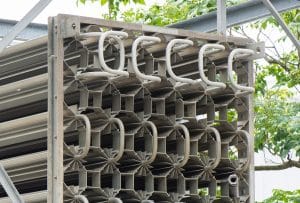 While different industries often share similar thermal management concerns, their specific needs can vary greatly. However, they all share the need for effective, efficient solutions that can perform consistently at minimal costs. Heat exchangers, such as heat pipe assemblies, are often utilized to meet those needs, and have become one of the most popular ways for dealing with electrical waste heat. For example, heat pipes that can be assembled to match any desired plane and angle can also be fashioned to meet almost any application’s performance parameters. (more…)
While different industries often share similar thermal management concerns, their specific needs can vary greatly. However, they all share the need for effective, efficient solutions that can perform consistently at minimal costs. Heat exchangers, such as heat pipe assemblies, are often utilized to meet those needs, and have become one of the most popular ways for dealing with electrical waste heat. For example, heat pipes that can be assembled to match any desired plane and angle can also be fashioned to meet almost any application’s performance parameters. (more…)
How Thermal Pins Have Disrupted the Molding Industry
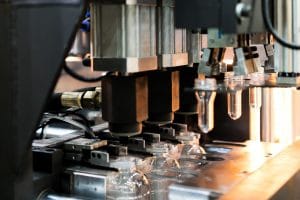 Virtually every industry was disrupted to some degree when heat exchangers became a popular thermal management solution. Those that relied on air conditioners and other cumbersome, costly solutions felt the impact most powerfully. After implementing heat exchangers, the costs of maintaining effective electrical cooling was significantly reduced. Also, the amount of downtime that companies experienced due to inefficient cooling systems also dropped significantly. Since then, however, heat exchanger technology has been adapted to a wide variety of applications outside of electrical cooling. In many industries, heat exchangers and specialized versions of them (such as thermal pins for the molding industry) have become a cornerstone of how they operate in nearly every way. (more…)
Virtually every industry was disrupted to some degree when heat exchangers became a popular thermal management solution. Those that relied on air conditioners and other cumbersome, costly solutions felt the impact most powerfully. After implementing heat exchangers, the costs of maintaining effective electrical cooling was significantly reduced. Also, the amount of downtime that companies experienced due to inefficient cooling systems also dropped significantly. Since then, however, heat exchanger technology has been adapted to a wide variety of applications outside of electrical cooling. In many industries, heat exchangers and specialized versions of them (such as thermal pins for the molding industry) have become a cornerstone of how they operate in nearly every way. (more…)
Using Heat Exchangers to Treat Wastewater Efficiently
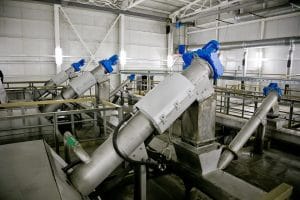 The effort to make operations greener and more eco-friendly is a strong one in most industries. For example, many companies have implemented wastewater treatment processes within their facilities to reduce their overall environmental footprints. While it’s a worthy investment, the technology and systems required to properly treat wastewater can be cumbersome, especially when it comes to the energy costs associated with supplying the heat needed to facilitate the process. In many cases, those costs can be drastically mitigated with the help of custom thermal solutions such as heat exchangers. (more…)
The effort to make operations greener and more eco-friendly is a strong one in most industries. For example, many companies have implemented wastewater treatment processes within their facilities to reduce their overall environmental footprints. While it’s a worthy investment, the technology and systems required to properly treat wastewater can be cumbersome, especially when it comes to the energy costs associated with supplying the heat needed to facilitate the process. In many cases, those costs can be drastically mitigated with the help of custom thermal solutions such as heat exchangers. (more…)
Other Ways Companies Benefit from Heat Exchangers
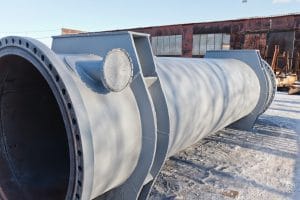 Heat exchangers have long been a vital component to most companies’ technological apparatus, most importantly as part of their electrical thermal management systems. When they first entered the sphere of manufacturing technology, for instance, most manufacturing companies quickly took advantage by changing out their older, more cumbersome air conditioners. Before long, companies in virtually every industry began enjoying the same streamlined, highly efficient thermal management that heat exchangers provided. Now, the same innovative heat transfer concepts are used for much more than just cooling electrical equipment. (more…)
Heat exchangers have long been a vital component to most companies’ technological apparatus, most importantly as part of their electrical thermal management systems. When they first entered the sphere of manufacturing technology, for instance, most manufacturing companies quickly took advantage by changing out their older, more cumbersome air conditioners. Before long, companies in virtually every industry began enjoying the same streamlined, highly efficient thermal management that heat exchangers provided. Now, the same innovative heat transfer concepts are used for much more than just cooling electrical equipment. (more…)
How Can Heat Exchangers Impact Food Production?
 In most industries, electrical thermal management plays a vital role in the equipment that companies rely on to remain operational. In some industries, however, thermal management plays a bigger role in much more than just cooling control panels and other electrical enclosures. For example, in the food and beverage industry, the ability to control and transfer heat is essential to everything from production and processes such as pasteurization and sterilization, to the safe packaging and shipping of most food and beverage products. With the help of modern, often customized heat exchangers, each of these processes can be made much simpler and more efficient. (more…)
In most industries, electrical thermal management plays a vital role in the equipment that companies rely on to remain operational. In some industries, however, thermal management plays a bigger role in much more than just cooling control panels and other electrical enclosures. For example, in the food and beverage industry, the ability to control and transfer heat is essential to everything from production and processes such as pasteurization and sterilization, to the safe packaging and shipping of most food and beverage products. With the help of modern, often customized heat exchangers, each of these processes can be made much simpler and more efficient. (more…)
Why Transferring Heat Is More Efficient than Cooling
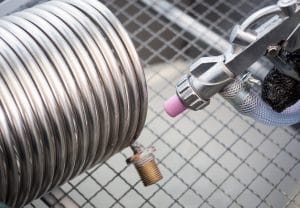 Electrical thermal management is a vital part of most companies’ operations. As such, the efficiency of a company’s electrical cooling systems plays a major role in its overall efficiency and productivity. Because of its importance, thermal management has also been a key focus of advancement for most modern technologies. For example, once it became obvious that traditional solutions, such as air conditioners, were too cumbersome and energy draining to be utilized for more advanced applications, companies began turning more frequently to heat exchangers. Rather than cooling electrical enclosures with chilled air, heat exchangers approach thermal management with the philosophy of transferring heat, which is a much more manageable and easily adaptable process. (more…)
Electrical thermal management is a vital part of most companies’ operations. As such, the efficiency of a company’s electrical cooling systems plays a major role in its overall efficiency and productivity. Because of its importance, thermal management has also been a key focus of advancement for most modern technologies. For example, once it became obvious that traditional solutions, such as air conditioners, were too cumbersome and energy draining to be utilized for more advanced applications, companies began turning more frequently to heat exchangers. Rather than cooling electrical enclosures with chilled air, heat exchangers approach thermal management with the philosophy of transferring heat, which is a much more manageable and easily adaptable process. (more…)
Advantages of Ambient Cooling with Heat Exchangers
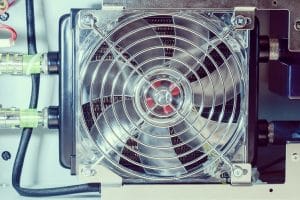 Ambient cooling is a natural way of keeping temperatures low, but for electrical thermal management, it wasn’t always a viable option. The most efficient way to achieve ambient cooling was to leave electrical components out in the open, which only leaves them exposed to moisture, contaminants, and other harmful environmental influences. However, with the advent of modern heat exchangers, ambient cooling has become highly efficient and effective at helping to keep even high-performance technologies cooled and functioning properly. Today, companies in nearly every industry now benefit from the many different advantages that ambient heat exchangers provide. (more…)
Ambient cooling is a natural way of keeping temperatures low, but for electrical thermal management, it wasn’t always a viable option. The most efficient way to achieve ambient cooling was to leave electrical components out in the open, which only leaves them exposed to moisture, contaminants, and other harmful environmental influences. However, with the advent of modern heat exchangers, ambient cooling has become highly efficient and effective at helping to keep even high-performance technologies cooled and functioning properly. Today, companies in nearly every industry now benefit from the many different advantages that ambient heat exchangers provide. (more…)
3 Things that Heat Exchangers Make More Efficient
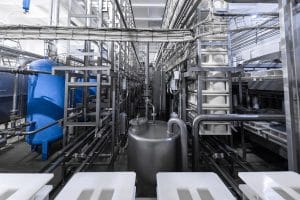 One of the main benefits of modern heat exchangers is their ability to make electrical thermal management an efficient and cost-effective process. That’s also one of the most important reasons why they continue to be vital aspects of most industries. Electrical thermal management and the solutions traditionally used to address it were once considered necessary, but heavy, burdens for companies to bear. After the implementation of more advanced heat exchangers, however, it became a much less complicated, less costly, and more reliable aspect of operations in most industries. (more…)
One of the main benefits of modern heat exchangers is their ability to make electrical thermal management an efficient and cost-effective process. That’s also one of the most important reasons why they continue to be vital aspects of most industries. Electrical thermal management and the solutions traditionally used to address it were once considered necessary, but heavy, burdens for companies to bear. After the implementation of more advanced heat exchangers, however, it became a much less complicated, less costly, and more reliable aspect of operations in most industries. (more…)
Making Heat Exchangers Work for Every Industry
 In most industries today, technology is more than a fad; it’s the backbone of most companies’ operations. Part of that backbone includes systems of electrical thermal management that, for better or worse, have a significant impact on the efficiency and productivity of the technology. Traditionally, most thermal management solutions included HVAC technologies, such as air conditioners. They’re effective enough at preventing electrical overheating that they were viable for most applications. However, today, modern heat exchangers have become a much more common solution, and companies in all industries continue to benefit from their advanced, eco-friendly, and high-performance heat transfer capabilities. (more…)
In most industries today, technology is more than a fad; it’s the backbone of most companies’ operations. Part of that backbone includes systems of electrical thermal management that, for better or worse, have a significant impact on the efficiency and productivity of the technology. Traditionally, most thermal management solutions included HVAC technologies, such as air conditioners. They’re effective enough at preventing electrical overheating that they were viable for most applications. However, today, modern heat exchangers have become a much more common solution, and companies in all industries continue to benefit from their advanced, eco-friendly, and high-performance heat transfer capabilities. (more…)







